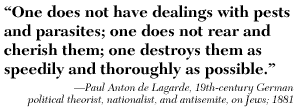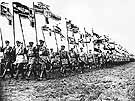
|
|
|

|

|

|

|
|
Click on an image to see a larger, more detailed picture.
|
|
|
|
|
| PROLOGUE: Roots of the Holocaust |

|
pg. 32 |

|
|
|
|
| |

|
 German soldiers, once part of a massive wartime army, found solidarity during the interwar years within the ranks of a nationalist veterans organization called Stahlhelm (Steel Helmet).
German soldiers, once part of a massive wartime army, found solidarity during the interwar years within the ranks of a nationalist veterans organization called Stahlhelm (Steel Helmet).
Photo: Bilderdienst SYddeutscher Verlag
|
|
Still, it remains a question whether Vienna's antisemitism simply became Hitler's during the period from 1907 to 1913. Documented antisemitic remarks from the young Hitler are hard to find. Viennese eyewitnesses reported that Hitler got along well with Jews at the time. The picture that emerges in Mein Kampf, however, suggests something else. There, Hitler highlights what he describes as a converting experience. "The visual instruction of the Vienna streets," wrote Hitler, "performed invaluable services." According to Hitler, he initially "wandered blindly" through the city, but as time passed he saw the city's people "with open eyes." In particular, he emphasized seeing "an apparition in a black caftan and black hair locks. Is this a Jew? was my first thought...but the longer I stared at this foreign face, scrutinizing feature for feature, the more my first question assumed a new form: Is this a German?" In Mein Kampf, Hitler went on to say that this decisive encounter convinced him that the Viennese Jews were not Germans of a particular religious persuasion but "a people in themselves." Mein Kampf says that Hitler's antisemitic vision became focused in Vienna, but that account was written more than a decade later, and much had happened during those intervening years. Of crucial importance was Hitler's experience in World War I. In 1913 Hitler avoided serving in the Austrian military by leaving Vienna. He lived in Munich for a time and then returned to Austria, where he was found physically unfit for military service. Nevertheless, when World War I began in August 1914, Hitler was elated, and he volunteered enthusiastically for the German Army. He spent the next four years on the Western Front, serving in France and Belgium as a dispatch runner, an often-dangerous duty that entailed carrying orders--on foot or by bicycle--from regimental commanders to leaders at the front. Hitler received a promotion to corporal on November 3, 1914, but rose no higher for reasons that remain unclear. Some accounts indicate that he refused to be considered for promotion; others suggest that his superiors found his leadership potential wanting. Nevertheless, Hitler, who was wounded in October 1916, served with distinction. His military decorations included the Iron Cross First Class, a special achievement for a corporal, which he received on August 4, 1918, thanks to his nomination by a Jewish officer named Hugo Guttman. By that time, huge German losses--about 800,000 men had fallen in the previous four months--made the German leadership recognize that the war was lost. In October 1918, shortly before the war ended, a mustard-gas attack temporarily blinded Hitler. By the time he recovered in the Pasewalk military hospital, Germany had surrendered. Along with many other Germans, Hitler was stunned by the news of defeat.
|
|

|

|

|

|
 1899-1902: The term "concentration camp" is coined by the British during the Boer War to denote holding areas for potentially threatening Afrikaners (descendents of Dutch who immigrated to South Africa in the mid-1800s).
1899-1902: The term "concentration camp" is coined by the British during the Boer War to denote holding areas for potentially threatening Afrikaners (descendents of Dutch who immigrated to South Africa in the mid-1800s).
|
 1903: The party platform of the nationalistic and aggressively antisemitic Narodowa Demokracja (National Democratic Party) is established in Poland. It encourages anti-Jewish pogroms and forced immigration.
1903: The party platform of the nationalistic and aggressively antisemitic Narodowa Demokracja (National Democratic Party) is established in Poland. It encourages anti-Jewish pogroms and forced immigration.
|
 1903-1906: A second wave of violently antisemitic pogroms sweeps Poland and the Ukraine; See 1881-1884; 1919-1921.
1903-1906: A second wave of violently antisemitic pogroms sweeps Poland and the Ukraine; See 1881-1884; 1919-1921.
|
 1905: A revised version of the apocryphal Protocols of the Elders of Zion is published in Russia.
1905: A revised version of the apocryphal Protocols of the Elders of Zion is published in Russia.
|
 1905: In Germany, the International Society for Racial Hygiene is founded to advance theories of Social Darwinism and selective breeding of human beings.
1905: In Germany, the International Society for Racial Hygiene is founded to advance theories of Social Darwinism and selective breeding of human beings.
|
 1907: Adolf Hitler is rejected for study at the Vienna Academy of Art.
1907: Adolf Hitler is rejected for study at the Vienna Academy of Art.
|
|
|
|
|
| PROLOGUE: Roots of the Holocaust |

|
pg. 32 |

|
|
The Holocaust Chronicle
© 2009 Publications International, Ltd.
|
|
